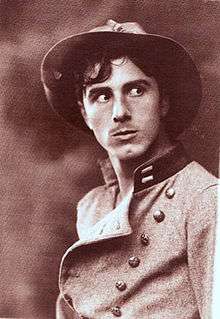George Beranger
| George Beranger | |
|---|---|
 1915 studio portrait of Beranger as Wade Cameron in the D. W. Griffith film The Birth of a Nation | |
| Born |
George Augustus Beringer 27 March 1893 Sydney, Australia |
| Died |
8 March 1973 (aged 79) Laguna Beach, California |
| Occupation | Actor, film director |
| Years active | 1913–1950 |
George Beranger (27 March 1893 – 8 March 1973), also known as André Beranger, was an Australian actor and film director of stage and Hollywood.[1]
Early life
Beranger was born George Augustus Beringer[1] in Enmore, New South Wales, Australia, the youngest of five sons of Caroline Mondientz and Adam Beringer, a German engine fitter. His mother committed suicide when he was three years old and he left home at the age of 14.[2] He studied acting at the College of Elocution and Dramatic Art founded by Scottish actor Walter Bentley.[2]
Career
Beranger began playing Shakespearean roles at the age of sixteen with the Walter Bentley Players. He then emigrated from Australia to California, United States in 1912[1] and worked in the silent film industry in Hollywood. According to a researcher, he "reinvented himself in Hollywood, claiming French parentage, birth on a French ocean liner off the coast of Australia and a Paris education."[2] Beranger worked under the names George Alexandre Beranger and André de Beranger.
By the 1920s, Beranger had become a star, appearing in the movies of Ernst Lubitsch and D. W. Griffith.[2] He also directed ten films between 1914 and 1924. Beranger owned a large Spanish-style home in Laguna Beach, rented a room at the Hollywood Athletic Club and owned an apartment in Paris, France.[2]
Beranger eventually appeared in more than 140 films between 1913 and 1950. Beranger's career dissipated following the 1930s Great Depression and the advent of sound film, and his roles in later films were small and often uncredited. He supplemented his income as a draftsman for the Los Angeles City Council. He sold his large properties and moved into a modest cottage beside his house in Laguna Beach.[2]
Beranger retired in 1952 and lived his later years in seclusion.[3] He was found dead of natural causes in his home on 8 March 1973.[4]
Selected filmography
- The Switch Tower (1913)
- The Well (1913)
- When Love Forgives (1913)
- The Birth of a Nation (1915)
- Let Katie Do It (1916)
- The Good Bad Man (1916)
- A Love Sublime (1917)
- A Daughter of the Poor (1917)
- Broken Blossoms (1919)
- Sinister Street (1922)
- Was She Guilty? (1922 – directed)
- The Leopardess (1923)
- His Hour (1924)
- The Man in Blue (1925)
- Are Parents People? (1925)
- The Big Parade (1925)
- Miss Brewster's Millions (1926)
- The Eagle of the Sea (1926)
- The Bat (1926)
- Fig Leaves (1926)
- If I Were Single (1927)
- Paradise for Two (1927)
- Altars of Desire (1927)
- Powder My Back (1928)
- Stark Mad (1929)
- Lilies of the Field (1930)
- Three Girls Lost (1931)
- Annabelle's Affairs (1931)
- Times Square Playboy (1936)
- Beauty for the Asking (1939)
- She Knew All the Answers (1941)
- Road House (1948)
- Wabash Avenue (1950)
References
- 1 2 3 Naturalization Records of the U.S. District Court for the Southern District of California, Central Division (Los Angeles), 1887-1940; Microfilm Serial: M1524; Microfilm Roll: 2.
- 1 2 3 4 5 6 Cosgrove, Bryony (3 March 2012). "The stuff of silent legend". Brisbane Times. Retrieved 14 November 2012.
- ↑ Kane, Rich (6 March 2012). "A Laguna Beach Silent Film Star's Story Sounds a Lot Like "The Artist"". Laguna Beach Patch. Retrieved 14 November 2012.
- ↑ "Film Maker G A Beranger Dies in Laguna". Los Angeles Times (Laguna Beach). 9 March 1973. p. Obituary.
Further reading
- Cosgrove, Bryony (December 2011). "Missing in Action, Caught on Film: Silent Film Actor "André de Beranger" Goes to War". Screening the Past (La Trobe University) (32). ISSN 1328-9756.
External links
|